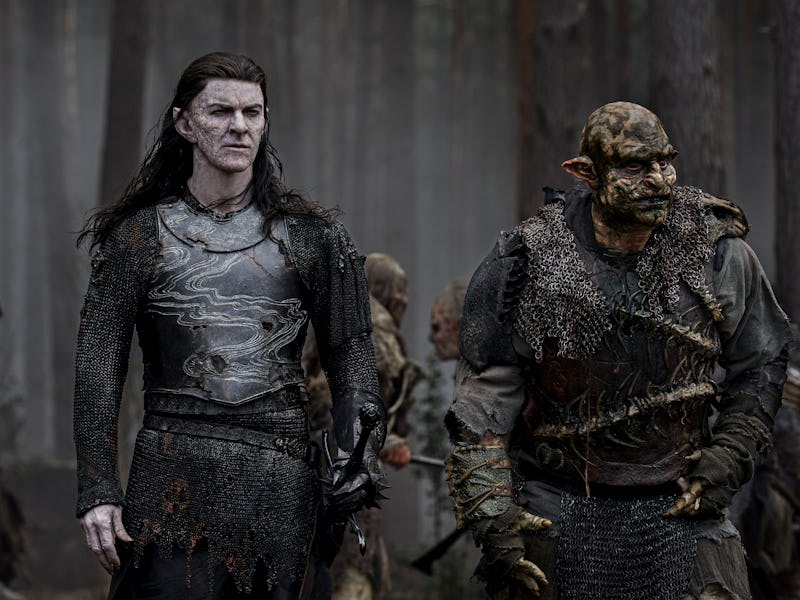Rings of Power Season 2’s Most Controversial Canon Change Is Also Its Best
"I thought you loved us."

Few of the creative decisions that The Lord of the Rings: The Rings of Power has made this season have caused as much of a stir online as its choice to briefly spotlight the existence of Orc women and children. The moment in question — a blink-and-you'll-miss-it shot in The Rings of Power Season 2's premiere — marks a major difference between the show’s take on Middle-earth and, for instance, Peter Jackson’s. Whereas Jackson depicted the Orcs as malevolent creatures literally born out of bubbles in the earth, The Rings of Power tries to give Middle-earth’s Orcs the humanity they've long been denied onscreen.
That decision hasn't been received particularly well by certain fans of J.R.R. Tolkien's work, even though the existence of Orc women and children is canonically sound. Up to this point, The Rings of Power's more humanist treatment of its Orc characters has largely been in service of Adar's campaign against Sauron and the Elven armies of Middle-earth. In its latest episode, however, The Rings of Power finally fulfills the promise of its more sympathetic treatment of Tolkien's least-beloved creation — and it does so by planting the seeds for a fallout between the Orcs and Adar, their once-hailed leader.
Spoilers ahead for The Rings of Power Season 2 Episode 7.
The Siege of Eregion
Adar makes a critical, likely fatal mistake in The Rings of Power Season 2’s penultimate episode.
The legendary Siege of Eregion, one of the most important battles in the Second Age of Middle-earth, is brought to life in horrifying, fiery fashion in this week's episode of The Rings of Power. While the installment ends with Adar emerging victorious over Elrond (Robert Aramayo) and the rest of his Elven foes, though, it also sets the stage for the Orc leader's inevitable downfall. Adar's attack on Eregion forces him to sacrifice countless Orc lives, even sending a deadly troll directly into the battle to indiscriminately slaughter soldiers on both sides. This act isn't lost on his Orc lieutenants, one of whom reacts to his mercenary treatment of his army by remarking in both sadness and horror, "I thought you loved us."
In this moment, The Rings of Power's depiction of Middle-earth's Orcs finally blooms into something not just admirable, but dramatically compelling. In the pages of The Silmarillion, The Hobbit, and The Lord of the Rings, the Orcs mostly come across as mindless baddies. Indeed, when Sauron reemerges in the Second Age, Tolkien originally wrote that they essentially fall back under his command without much protest and blindly follow him into another war against the Elves. In The Rings of Power, the Orcs behave very differently.
They're portrayed as enslaved, ostracized beings who were created through potentially horrifying means and then forced into a devastating war in the First Age by Morgoth. Consequently, by the time Sauron has risen to take Morgoth's place, they're not interested in following him. Instead, they back Adar, an original creation of The Rings of Power and a leader they believe cares enough about them not to send them to die simply to further his own aims. It's for this reason that Adar's short-sighted betrayal of the Orcs in The Rings of Power Season 2 carries such an ominous, tragic weight. In doing so, he has paved a path for the Orcs to start logically searching for a new leader to replace him.
Sauron and the Orcs
He doesn’t realize it yet, but Adar is starting to lose the trust of those he claims to treasure most.
It's not hard to imagine Sauron positioning himself as such a leader. After all, we’ve already seen the Dark Lord disguise himself as a kindlier figure to deceive both Galadriel and Celebrimbor. Should he attempt — and succeed — at painting himself as a more compassionate leader in the Orcs’ eyes than Adar, then the brilliance of The Rings of Power's approach to its Orc storyline will be well and truly clear.
The series will have found a way to turn Sauron’s Second Age reclamation of his Orc army from a minor detail that’s treated as a given into a nuanced storyline. Even better, it’ll be a dramatic beat that both feels earned and fulfills The Rings of Power's desire to cast Middle-earth's Orcs in a more complex light than, frankly, The Silmarillion and the Lord of the Rings books do. Their decision to begin following Sauron again even after what his and Morgoth’s combined leadership cost them in the First Age will actually make sense.
This season of The Rings of Power is, in other words, on the verge of turning the Siege of Eregion into a tragic turning point not only for The Rings of Power's Elves but also for Adar and his Orc followers. The conflict now seems destined to end in defeat for everyone except Sauron, which means The Rings of Power has finally succeeded in bringing new dimension and depth to its Orc characters. Now, they no longer seem like bland villains, but beings who are tired of being taken advantage of by tyrannical leaders and yet can't break free of that cycle. That's a much more interesting outcome than if they had just remained a bunch of monstrous redshirts.
The Lord of the Rings: The Rings of Power's Season 2 finale premieres Thursday, October 3 on Prime Video.